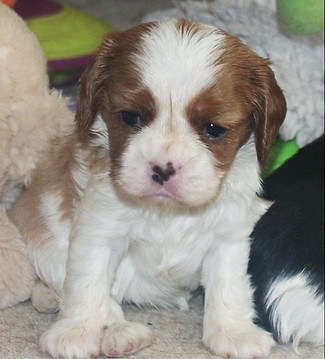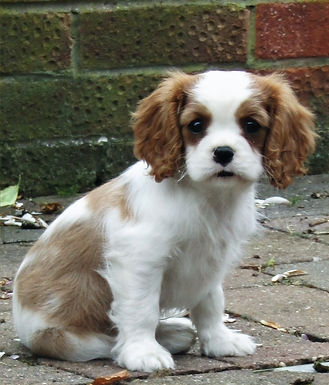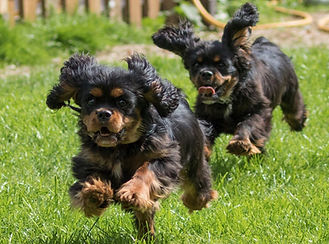
Carsan Cavaliers
Crate and Early puppy training.






They may look a bit like a puppy prison, but with a comfy blanket and some warm bedding, your puppy will come to love its own special space. Crates can be used indoors, or in the car, to give your puppy a sense of safety and comfort. A place to escape. Some puppies will, of course, be unsure at first, so:
-
Start by finding a quiet, warm, draught-free spot for your crate. A kitchen, or a cosy utility room are ideal; but not too close to a radiator.
-
Get your puppy used to wanting to enter by showing it its dinner or treats and placing them on the floor inside the crate. If your puppy won’t enter, close the door with your puppy on the outside. Leave it there for a few seconds wondering how to get at dinner, then open the door and see how quickly your puppy rushes in!
-
Put some comfortable bedding in the bottom of the crate, and drape a blanket over the top, covering three sides but leaving the front uncovered, to create a den. Add a safe chewy toy.
-
Place your puppy in its crate for short sessions throughout the day. At first leave the door open, it will be so cosy in there, it’ll probably choose to go in for a nap on its own.
-
Gradually get your puppy used to the door being closed, by putting it inside, closing the door, and then staying close by for a few minutes. Stay relaxed; if you’re stressed, think how nervous your puppy will become!
-
Slowly increase the length of time your puppy is in the crate with the door shut, so that it can be left for an hour while you go to the shops.
-
Allow free access when you are home, so your puppy can come and go as it pleases. Time away from people is important; it teaches independence.
-
Placing your puppy in its crate for the night means you know it will be safe, and will encourage it to be clean, as puppies hate to soil their sleeping area. For the same reason it’s important that you take your puppy out to relieve itself last thing at night, once or twice during the night, and first thing in the morning, to avoid accidents. It may need some extra attention during his first night at home.
-
Never use the crate as a sin bin. Your puppy must never be put in the crate for doing something wrong, and must never be left inside for long hours.
House Training
It’s the bit of puppy training that every new owner dreads! But if you stick to the rules, it needn’t be nearly as frustrating as you expect. Use your puppy's crate so that he never relieves himself indoors and can be taken outside whenever he needs to go, especially during the first few weeks. A few helpful tips:
-
Before your bring your new puppy home, choose a toilet spot in your garden. A paved area is a good idea, as it is easy to clean. Grass will inevitably turn yellow and die, but bitches often prefer soft textures like sand or soil. Wording?
-
Take your puppy to this spot at the following times:
-
First thing in the morning.
-
Last thing at night.
-
After exercise.
-
After excitement (such as meeting someone new, or returning home).
-
After eating and drinking.
-
Before a nap.
-
If you see them circling and sniffing the ground.
-
Otherwise, every two to three hours during the day.
-
-
Always accompany the pup outside. If you just open the door and let it get on with it, it’ll probably play, but may not relieve itself. Then, when it returns indoors, it may have an accident. If your puppy does relieve itself outside, you must be there to reinforce the command, and to praise and reward it. In cold, wet weather, or at night, wrap up warm, and take an umbrella and a torch out with you!
-
When you take your puppy to its toilet spot, encourage it to stay there, rather than allowing it to run off. Use a lead if necessary.
-
When your puppy relieves itself, immediately say the ‘magic words’ that you want to use in future as a request for it to go. Give your puppy lots of praise, so it knows it has done well, remove the lead if you have had to use it, and enjoy a game together in the garden. Treats come in useful on the first few trips.
-
Never return straight indoors afterwards. Your puppy will work out that the fun of being outdoors comes to an end if it 'goes', and so will hold on in order to stay out.
-
Once your puppy understands the command, practice with the routine on different surfaces in your garden and later away from home. Train your puppy on tarmac, concrete, grass, gravel, etc.
-
Most importantly, NEVER PUNISH YOUR PUPPY FOR ACCIDENTS. They do happen.
-
Rubbing a pup's nose in mess is cruel and teaches it nothing except to fear you.
-
If you shout at your puppy when your find a puddle, it won’t know why you are angry. Shouting at, or worse, smacking, will just make your puppy wary of you, and break down the bonds between you.
-
If you find an accident, simply clean it up, using a non-ammonia based cleaner. Your vet or pet shop will be able to supply you with a suitable cleaner. You should try and eliminate any odour, as any odour left may encourage the pup to re-mark. Biological washing powder solution works well as it “breaks down” the smell.
-
If you catch your puppy mid-flow, make a noise to catch its attention, stop it in its tracks, and then encourage your puppy to follow you outside, using a fun, excited tone of voice. If it finishes outside, give it lots of praise, play a while and then bring it back indoors.
If you stick to a strict routine, your puppy will very quickly learn to be clean in the house. But don’t get complacent or your puppy’s house training can lapse. Continue with the routine until your are sure that it knows never to soil indoors and can hold itself. Only gradually phase out numerous outdoor trips. If it has any accidents, increase the number of toilet visits once more.
Biting
Your puppy must learn early that it cannot bite people. All puppies mouth, especially during teething, but this shouldn’t be tolerated. Sharp puppy teeth are bad enough, but if it continues to mouth into adulthood, it can become dangerous.
-
Tell all friends and family that if your puppy bites or mouths, they must make a loud, high-pitched yelping noise, and then turn away from the puppy and ignore it. No reprimands, and no rough games. Both of these are likely to make things worse.
-
You must be consistent, even if the puppy doesn’t hurt you.
-
Your puppy must be ignored, so it knows that the game stops if it oversteps the mark.
-
Your response will be similar to how your puppy’s littermates would react if it hurt them, so your puppy will understand what it has done wrong.
Name Familiarity
To help your puppy learn its name:
-
Make sure you choose a name that is short, and easy for it to get used to.
-
When your puppy is having fun, playing, petting or eating, say its name over and over. So your puppy associates it with good things, and learns to come when it hears it.
-
Never shout your puppy’s name if you are angry with it.
-
Be consistent. Make sure all family members call the puppy the same thing, pronounced the same way. No nicknames.
All the planning and preparation is over. It’s time to collect your puppy and welcome him or her into your home. Here are a few tips to make sure the big day goes smoothly.
Before you leave
-
Arrange to collect your puppy during the morning. That way you’ll have plenty of time to get it settled in before night-time.
-
Don’t go alone. If necessary ask a friend or family member to drive you to the breeder so you can concentrate on your new addition all the way home.
-
Make sure the puppy’s crate is in position and ready for when you get back, with some snuggly bedding in position, in the place where it will always be. Ideally choose a quiet corner where it won't be disturbed and can retreat to easily when it fancies a nap.
What to take
-
Kitchen paper, carrier bags or a couple of old towels in case of accidents en route.
-
A travel crate and bedding. Don’t hold your puppy on your lap. This is dangerous in the event of an accident and sets an unhealthy precedent.
-
A bowl, a bottle of water, and several empty bottles.
-
Your chequebook!
What to ask
Make sure you know or ask for before you leave the breeder:
-
Details of what your puppy is currently being fed and when. Most breeders will provide you with some food to get you started.
-
Many breeders also provide information on grooming and general care.
-
Details of the puppy's worming schedule, vaccinations, certificates and any other health treatments it may have received.
-
If you are collecting a pedigree pup, its Kennel Club registration certificate and a copy of its pedigree.
-
Many breeders offer free insurance for the first few weeks - if so, ask for the paperwork.
-
A receipt for the money you pay.
-
If you’ve given a towel with your scent on it to the breeder in advance of collection, make sure you have it back for the journey home.
-
Ask to fill up a couple of empty bottles with the breeder's tap water as it is possible that a sudden change in water type, could cause stomach upset.
Copyright © 2024 Carol MacKenzie All rights reserved
Telephone 01945 700424













